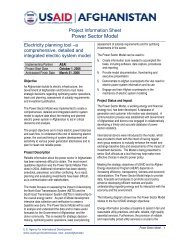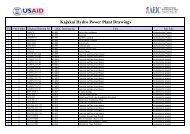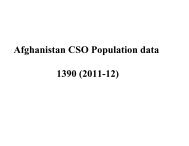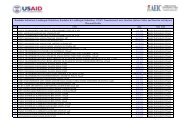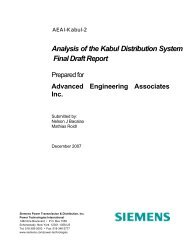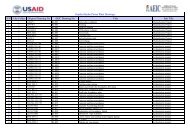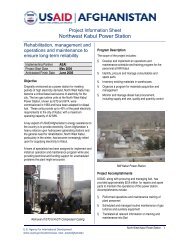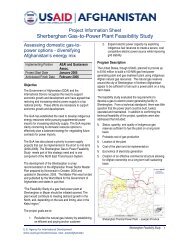prioritization and implementation plan - Cooperazione Italiana allo ...
prioritization and implementation plan - Cooperazione Italiana allo ...
prioritization and implementation plan - Cooperazione Italiana allo ...
Create successful ePaper yourself
Turn your PDF publications into a flip-book with our unique Google optimized e-Paper software.
community <strong>and</strong> regional neighbors in the following<br />
areas:<br />
• Strengthen the capacity of relevant Afghan<br />
ministries dealing with repatriation <strong>and</strong> to<br />
assist them to establish better coordination<br />
with their counterparts in the region.<br />
• Support a conducive Afghan environment that<br />
retains returning Afghan refugees by fostering<br />
job opportunities <strong>and</strong> the provision of basic<br />
needs, such as l<strong>and</strong>, water, electricity, shelter,<br />
health-care, <strong>and</strong> general education.<br />
• Facilitate progress towards the goal of<br />
sustainable refugee reintegration, as envisaged<br />
by the tripartite arrangements for voluntary<br />
repatriation with the Islamic Republics of Iran<br />
<strong>and</strong> Pakistan.<br />
Regional Economic Cooperation<br />
The Government of Afghanistan attaches specific<br />
importance to regional economic cooperation, as<br />
the key Afghan enabler for increasing prosperity,<br />
improving the welfare of the people, enhancing<br />
confidence <strong>and</strong> underst<strong>and</strong>ing between<br />
governments, <strong>and</strong> building peace <strong>and</strong> stability in<br />
the region. The Kabul Conference will, therefore,<br />
seek further regional <strong>and</strong> international support to:<br />
• The <strong>implementation</strong> of the following regional<br />
projects: (i) Central Asia - South Asia Energy<br />
Market (CASAREM) initiative; (ii)<br />
Turkmenistan, Afghanistan, Pakistan <strong>and</strong> India<br />
(TAPI) natural gas pipeline project; <strong>and</strong> (iii)<br />
Construction of the Shirkhan B<strong>and</strong>er to Herat;<br />
K<strong>and</strong>ahar to Spin Boldak; <strong>and</strong> Jalalabad to<br />
Torkham railway lines.<br />
• Strengthen border management cooperation to<br />
ensure a united approach to address crosscutting<br />
issues, such as strengthening trade<br />
facilitation; customs clearance harmonisation;<br />
environmental protection; <strong>and</strong> encouraging<br />
regular <strong>and</strong> deeper dialogue on border security<br />
<strong>and</strong> management with regional neighbors.<br />
• Agreement on a coordination mechanism<br />
between nine key regional bodies (ECO,<br />
SAARC, SCO, OIC, CAREC, OSCE,<br />
UNESCAP, GCC, CICA) to ensure a coherent<br />
approach <strong>and</strong> <strong>plan</strong> for harmonizing regional<br />
initiatives with a strong Afghan component.<br />
45<br />
• Encourage regional bodies <strong>and</strong> neighboring<br />
countries to coordinate their regional initiatives<br />
through the recently established Center for<br />
Regional Cooperation (CRC) at the<br />
Afghanistan Ministry of Foreign Affairs.<br />
• Expedite the conclusion of the Afghanistan -<br />
Pakistan Trade <strong>and</strong> Transit Agreement<br />
(APTTA) for the benefit of the wider region,<br />
with the aim of signing an agreement in the<br />
near future.<br />
• Expedite the agreed deliverables from the third<br />
Regional Economic Cooperation Conference<br />
(RECCA III), held in May 2009 in Islamabad.<br />
Encourage <strong>and</strong> support the Government of<br />
Afghanistan to present concrete programs at<br />
RECCA IV in the following areas: sustainable<br />
natural resources development <strong>and</strong><br />
management; national <strong>and</strong> regional<br />
employment support; transfer <strong>and</strong> access to<br />
energy; creation of modern transport<br />
infrastructure; facilitate the growth of regional<br />
trade <strong>and</strong> transit; <strong>and</strong> intra-regional investment<br />
in the extraction industries.<br />
• Facilitate dialogue on labor migration between<br />
countries in the region (especially Gulf<br />
Cooperation Council countries) <strong>and</strong> the<br />
Government of Afghanistan to better regulate<br />
labor flows <strong>and</strong> to increase receptiveness to an<br />
Afghan work force.<br />
Conclusion<br />
The Kabul International Conference on<br />
Afghanistan provides an ideal opportunity for<br />
regional neighbors, regional organizations, <strong>and</strong><br />
other international partners to:<br />
• Re-confirm their commitment to regional<br />
cooperation at the London Conference <strong>and</strong> to<br />
help deliver concrete outcomes in the four<br />
thematic areas identified above.<br />
• Coordinate activities to reduce overlap or<br />
duplication of efforts.<br />
• Support the <strong>implementation</strong> of regionaloriented<br />
programs <strong>and</strong> initiatives for the<br />
benefit of citizens in the wider region.<br />
• Further facilitate Afghan migrant workers who<br />
contribute to the economies of countries in the<br />
region.




